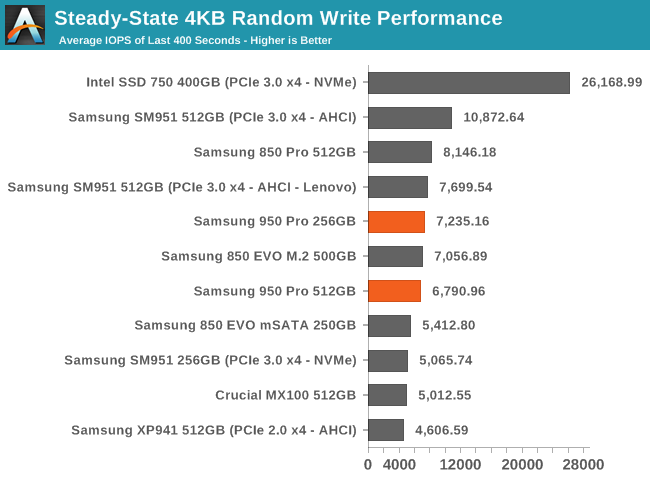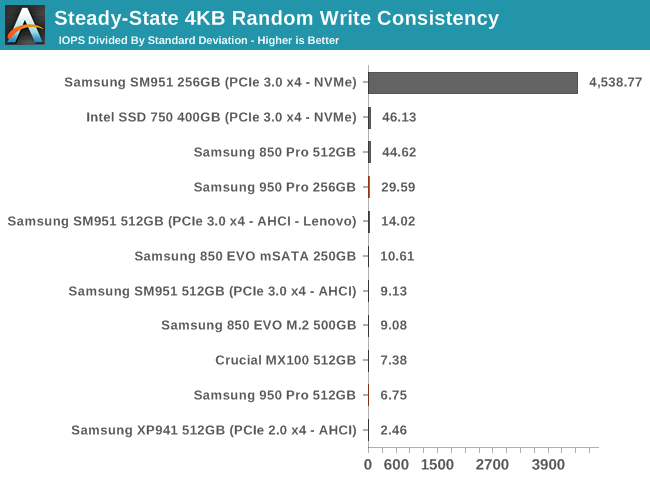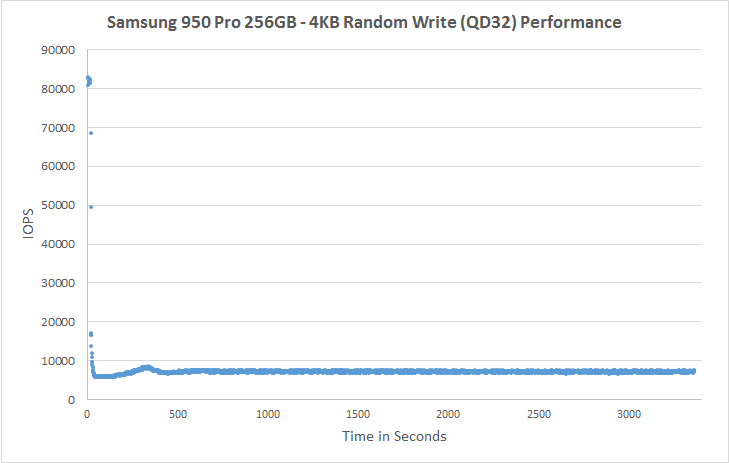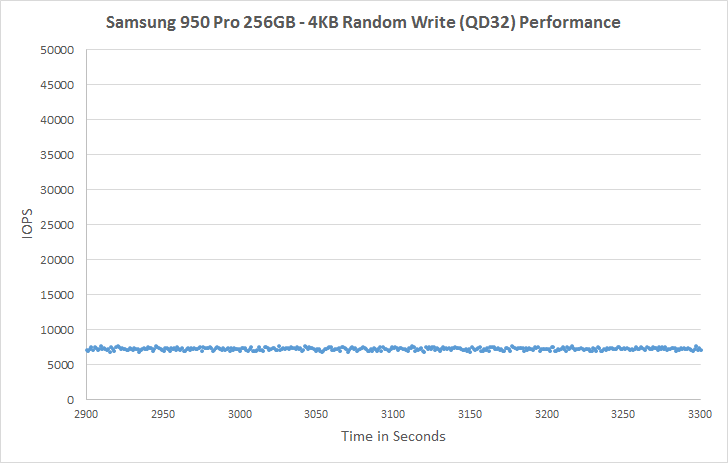The Samsung 950 Pro PCIe SSD Review (256GB and 512GB)
by Billy Tallis on October 22, 2015 10:55 AM ESTPerformance Consistency
Kicking things off, our performance consistency test saturates the drive with 4kB random writes for a full hour, with a queue depth of 32, the maximum supported by the AHCI protocol used by SATA and most PCIe drives. This puts the drive's controller under maximum stress and writes enough data to exhaust all free space and spare area on the drive. This is an unrealistic workload for any client use, but it provides a worst-case scenario for long-term heavy use, and it sheds light on how different SSD controllers behave and if their performance will hold up as they fill up.
The average of the last 400 seconds of the test gives us a steady-state IOPS rating that is usually very different from what the manufacturer specifies for a new, empty drive. We also quantify the consistency of the drive's random write performance, and provide plots of the performance over the course of the test.

Once steady state is reached, performance is determined more by the controller's algorithms than the interface speed, so it's not too surprising to see the 950 Pro performing similarly to other Samsung drives.

The consistency metric shows a surprising disparity between the two 950 Pros, with the 256GB performing much better.
 |
|||||||||
| Default | |||||||||
| 25% Over-Provisioning | |||||||||
Comparing the graphs of the two 950s shows that the inconsistency of the 512GB drive comes from frequent jumps in performance above a solid baseline. This pattern holds even for the test with overprovisioning. Graphing the power consumption over time (not shown) reveals that the periods of lower performance have lower power. If the lower performance were due to periodic background garbage collection, then we would expect power consumption to be at least as high as when the drive is performing well. Instead, it appears that the 512GB drive is experiencing thermal throttling.
 |
|||||||||
| Default | |||||||||
| 25% Over-Provisioning | |||||||||
With most of its time spent thermally limited, our 512GB sample's low average is explained. It appears that the thermal throttling mechanism is bumping the drive down to one of several discrete performance levels, rather than a continuous performance mechanism.










142 Comments
View All Comments
sorten - Friday, October 23, 2015 - link
'elsewhere' is one wordFrozenGiraffe - Thursday, October 22, 2015 - link
And why would these people boot it every day?Rajinder Gill - Friday, October 23, 2015 - link
If speed matters that much, use S3 resume, it is the fastest way back to the desktop. :)Samus - Friday, October 23, 2015 - link
I reboot my PC 3 times a year. I could give two shits in a cup about boot times.5th element - Monday, October 26, 2015 - link
Couldn't. It's couldn't give two shits not could.Beaver M. - Thursday, October 22, 2015 - link
With the beta NVMe driver it takes about 300 ms longer.geniekid - Thursday, October 22, 2015 - link
http://techreport.com/review/29221/samsung-950-pro...Based on that link I would say issues with NVMe boot times are largely firmware issues that are being rectified.
Refuge - Thursday, October 22, 2015 - link
If they updated their baseline every time new tech came out then they would be so busy retesting to have comparable results, that we would never see a new review ever again.AnnonymousCoward - Thursday, October 22, 2015 - link
Thanks geniekid! That review is far more valuable than what we have here on AT. AT said "loading a new level in a video game would be more likely to show noticeable difference from better performance here". More likely, huh. Then you go look at the actual data at techreport and find there's nearly zero difference. When will AT learn to measure an SSD in an actually useful way?StrangerGuy - Thursday, October 22, 2015 - link
Game load times are actually the least sensitive to SSD speeds. Even a 15 year old game like Red Alert 2 with a next to zero RAM footprint certainly doesn't load instantly on a Crucial M550, much less current titles.